Free E-Mail
Bible Studies
Beginning the Journey (for new Christians). en Español
Old Testament
Abraham
Jacob
Moses
Joshua
Gideon
David, Life of
Elijah
Psalms
Solomon
Songs of Ascent (Ps 120-135)
Isaiah
Advent/Messianic Scriptures
Daniel
Rebuild & Renew: Post-Exilic Books
Gospels
Christmas Incarnation
(Mt, Lk)
Sermon on the Mount
(Mt 5-7)
Mark
Luke's
Gospel
John's Gospel
7 Last Words of Christ
Parables
Jesus and the Kingdom
Resurrection
Apostle Peter
Acts
The Early Church
(Acts 1-12)
Apostle Paul
(Acts 12-28)
Paul's Epistles
Christ Powered Life (Rom 5-8)
1 Corinthians
2 Corinthians
Galatians
Ephesians
Vision for Church
(Eph)
Philippians
Colossians,
Philemon
1
& 2 Thessalonians
1 & 2 Timothy,
Titus
General Epistles
Hebrews
James
1 Peter
2 Peter, Jude
1, 2, and 3 John
Revelation
Revelation
Conquering Lamb of Revelation
Topical
Glorious Kingdom, The
Grace
Great Prayers
Holy Spirit, Disciple's Guide
Humility
Lamb of God
Listening for God's Voice
Lord's Supper
Names of God
Names of Jesus
Christian Art
About Us
Podcasts
Contact Us
Dr. Wilson's Books
Donations
Watercolors
Sitemap
Introduction to Philippians
The City of Philippi
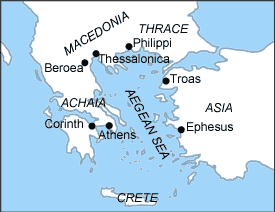 Map of Macedonia, Greece, and Asia Minor |
The letter was written to Christians in the Macedonian city of Philippi. Its history goes back to 361 BC, when a number of Greek settlers took over the obscure Thracian village of Krenides ("springs"). Philip II of Macedon, the Father of Alexander the Great, annexed the whole region in 356 BC and formally established Philippi as a city bearing his own name. It was fortified with an extensive city wall, part of which still survives. A garrison stationed there made it a military strong point to guard gold from the nearby mines, which enriched Philip by 1000 talents of gold each year.
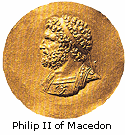 The Romans conquered Macedonia in 168-167 BC. In 42 BC, Mark
Antony and Octavian defeated the Roman Republican forces of Brutus and Cassius
(remembered as the assassins of Julius Caesar). The victors settled many of
their veteran soldiers in Philippi and established it as a Roman colony, which
grew still more when additional former soldiers were given land there.
The Romans conquered Macedonia in 168-167 BC. In 42 BC, Mark
Antony and Octavian defeated the Roman Republican forces of Brutus and Cassius
(remembered as the assassins of Julius Caesar). The victors settled many of
their veteran soldiers in Philippi and established it as a Roman colony, which
grew still more when additional former soldiers were given land there.
Philippi was given the high honor of the ius Italicum ("law of Italy"), which meant that it was governed by Roman law, its citizens were Roman citizens, its constitution was modeled after Rome's, its architecture copied Roman styles, its coins bore Roman inscriptions, Latin was widely used, and its citizens wore Roman dress.
In spite of a strong Roman influence, the city's religious life was quite diverse. It included monuments reflecting emperor worship, plus Greek gods and their Roman counterparts, especially Jupiter (known in the Greek world as Zeus). The local Thracians worshipped the goddess Artemis, while there were also sanctuaries to Egyptian gods, especially Isis and Serapis, and to the Phrygian Cybele, known as the great Mother-goddess. There was a small Jewish community, but probably not a regular synagogue congregation which would have required ten men. Instead, several women met outside the city on the Sabbath for prayer (Acts 16:13).[1]
The Church at Philippi
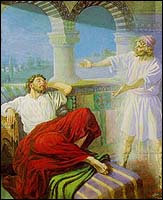 The Gospel came to Philippi sometime around 49 to 52 AD. On
the Second Missionary Journey, Paul and Silas were "kept by the Holy Spirit from
preaching the word in the province of Asia" (Acts 16:6). They tried to go into
Bithynia, "but the Spirit of Jesus would not allow them" (Acts 16:7). They
finally reached the coast at Troas, where Paul had a vision of a Macedonian
begging him, "Come over to Macedonia and help us" (Acts 16:9). Paul took this as
God's call.
The Gospel came to Philippi sometime around 49 to 52 AD. On
the Second Missionary Journey, Paul and Silas were "kept by the Holy Spirit from
preaching the word in the province of Asia" (Acts 16:6). They tried to go into
Bithynia, "but the Spirit of Jesus would not allow them" (Acts 16:7). They
finally reached the coast at Troas, where Paul had a vision of a Macedonian
begging him, "Come over to Macedonia and help us" (Acts 16:9). Paul took this as
God's call.
In Philippi, Paul and Silas met some women praying on the Sabbath at the river, led by Lydia, "a dealer in purple cloth from the city of Thyatira, who was a worshipper of God" (Acts 16:14). She welcomed Paul's message, was baptized with her household, and invited the missionaries and a cluster of believers into her home, where the tiny church began to grow.
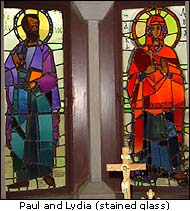 One day they were met by a slave girl who prophesied from an
evil spirit. Finally Paul turned to her and said to the spirit, "In the name of
Jesus Christ I command you to come out of her." With their slave girl no longer
able to prophecy, her owners had Paul and Silas flogged and thrown in prison for
"throwing our city into an uproar by advocating customs unlawful for us Romans
to accept or practice" (Acts 16:20-21). At midnight an earthquake opened the
prison doors and the jailer was converted and baptized with his household in the
middle of the night. At daylight, Paul and Silas were thrown out of town, but
not before a church had been established.
One day they were met by a slave girl who prophesied from an
evil spirit. Finally Paul turned to her and said to the spirit, "In the name of
Jesus Christ I command you to come out of her." With their slave girl no longer
able to prophecy, her owners had Paul and Silas flogged and thrown in prison for
"throwing our city into an uproar by advocating customs unlawful for us Romans
to accept or practice" (Acts 16:20-21). At midnight an earthquake opened the
prison doors and the jailer was converted and baptized with his household in the
middle of the night. At daylight, Paul and Silas were thrown out of town, but
not before a church had been established.
After Paul and Silas left, Luke may have stayed on in Philippi.[2] Paul kept in touch with the Macedonian churches through Timothy (Acts 19:21-23; Philippians 2:19-20) and visited them twice more, probably during the autumn of 54-55 and again in the spring of 55-56 (Acts 20:1-3).
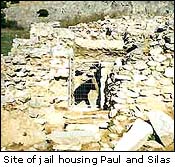 The church at Philippi provided financial and material
support several times during Paul's journeys. He bragged to the Corinthians
about their generosity:
The church at Philippi provided financial and material
support several times during Paul's journeys. He bragged to the Corinthians
about their generosity:
"We want you to know about the grace that God has given the Macedonian churches. Out of the most severe trial, their overflowing joy and their extreme poverty welled up in rich generosity. For I testify that they gave as much as they were able, and even beyond their ability.... They gave themselves first to the Lord and then to us in keeping with God's will" (2 Corinthians 8:1-5).
They shared with Paul a "partnership in the gospel from the first day" (Philippians 1:5). Paul recalls, "In the early days of your acquaintance with the gospel, when I set out from Macedonia, not one church shared with me in the matter of giving and receiving, except you only; for even when I was in Thessalonica, you sent me aid again and again when I was in need" (4:15-16). The warm Letter to the Philippians is strong evidence to this deep love between the apostle and some of his dearest converts.
Author
Paul's authorship of Philippians was unanimously supported among the Church Fathers and has rarely been challenged in our day. Nearly all scholars accept this as a genuine letter of Paul.
Date and Place of Composition
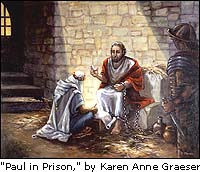 But there's no unanimity on the date and place of
composition. Clearly it was written by Paul when he was in prison (1:7, 13, 14),
a serious imprisonment (1:20-24, 30; 2:17), expected to end in a trial that
could result in his death if convicted. In their attempts to fit this
imprisonment into a chronology of Paul's life, scholars have presented cogent
arguments for each of three possible locations and dates:
But there's no unanimity on the date and place of
composition. Clearly it was written by Paul when he was in prison (1:7, 13, 14),
a serious imprisonment (1:20-24, 30; 2:17), expected to end in a trial that
could result in his death if convicted. In their attempts to fit this
imprisonment into a chronology of Paul's life, scholars have presented cogent
arguments for each of three possible locations and dates:
- Ephesus (ca. 54-55 AD),
- Caesarea (57-59 AD), and
- Rome (60-62 AD), the traditional view.
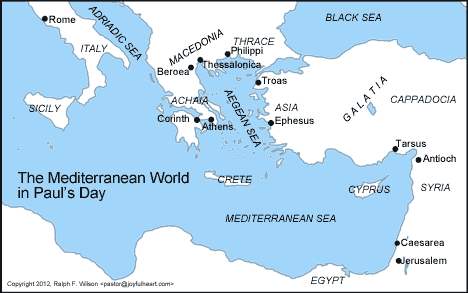
Fortunately, it doesn't matter greatly to the teaching of Philippians which it was. In my exposition, I'll refer to Rome as the place of Paul's captivity, which is the place of composition I deem most likely.
Opponents
There are several opponents mentioned in Philippians: (1) rival Christian preachers (1:15-18), (2) non-Christians who oppose the Gospel (1:1:27-28; 3:18-19), (3) Euodia and Syntyche, members at Philippi who are feuding with each other (4:2-3), and (4) a group who Paul refers to as "those dogs, those men who do evil, those mutilators of the flesh" (3:2). This latter group has spawned a multitude of identifications. It seems pretty clear, however, that these are Judaizers, that is, "Jewish Christian missionaries from outside the congregation who wanted Gentile Christians to become Jews in practice," particularly by having them circumcised.[3]
Occasion and Purposes
Paul's immediate concerns in writing this letter are:
- To recommend to the Philippians one of their number, Epaphroditus, who had come to help him in prison, but had fallen ill and was being sent home.
- To let the concerned Philippians know about the current state of Paul's welfare.
- To prevent the Judaizers from persuading the Philippian Christians to submit to circumcision.
- To encourage the Philippian believers to quiet their dissention and be united.
Through the letter, however, Paul does much more than this. He provides the inspiration and encouragement of a friend, mentor, and fellow believer who finds Christ's strength and peace while struggling with opponents, anxiety, physical needs, and fear for his life. To see how a man, an apostle, meets obstacles and overcomes them in Christ, makes this letter very relevant for our day, too.
Themes
Paul develops several themes in Philippians -- joy and fellowship among others.
Rejoicing
Joy, the Greek noun chara, "the experience of gladness,"[4] "rejoicing, merriness."[5] like its verb form, chairō, "rejoice, be merry,"[6] is related to the noun charis, "grace, favor," originally, "that which delights."[7] Sometimes Christians act as if Christianity were a sorrowful religion. It is not. It is a religion of joy and love. Joy and rejoicing are key and frequent words in Philippians.
1:4 - " In all my prayers for all of you, I always pray with joy...."
1:18 - "The important thing is that in every way, whether from false motives or true, Christ is preached. And because of this I rejoice. Yes, and I will continue to rejoice...."
1:25-26 - "Convinced of this, I know that I will remain, and I will continue with all of you for your progress and joy in the faith, so that through my being with you again your joy in Christ Jesus will overflow on account of me."
2:2 - "Make my joy complete by being like-minded, having the same love, being one in spirit and purpose."
2:16-18 - "But even if I am being poured out like a drink offering on the sacrifice and service coming from your faith, I am glad and rejoice with all of you. So you too should be glad and rejoice with me."
2:28-29 - "Therefore I am all the more eager to send him, so that when you see him again you may be glad and I may have less anxiety. Welcome him in the Lord with great joy, and honor men like him...."
3:1 - "Finally, my brothers, rejoice in the Lord!"
4:1 - "Therefore, my brothers, you whom I love and long for, my joy and crown, that is how you should stand firm in the Lord, dear friends!"
4:4 - "Rejoice in the Lord always. I will say it again: Rejoice!"
4:10 - " I rejoice greatly in the Lord that at last you have renewed your concern for me."
For Paul, joy is a key component of the Christian life -- a fruit of the Spirit (Galatians 5:22) and "joy in the faith" (Philippians 1:25). "The kingdom of God is ... righteousness, peace and joy in the Holy Spirit" (Romans 14:17). This is not just a present joy in the midst of trials, but a joy that will reach its completion in the future Kingdom of God.
Fellowship
Koinōnia is another keyword in Philippians. "Partnership" (NIV), "sharing" (NRSV), and "fellowship" (KJV) is the Greek noun koinōnia, "close association involving mutual interests and sharing, association, communion, fellowship, close relationship." It is used often to describe relationships with God and with others in the Christian community," as it does here. It sometimes edges into the meaning of "participation, sharing," as in 3:10 "sharing his sufferings" and in the Lord's Supper (1 Corinthians 10:16).[8] Here are its occurrences in Philippians.
1:5 - "I always pray with joy because of your partnership in the gospel from the first day until now."
1:7 - "... All of you share in God's grace with me."
2:1 - "... if any fellowship with the Spirit...."
3:10 - "I want to know Christ and the power of his resurrection and the fellowship of sharing in his sufferings...."
4:14 - "Yet it was good of you to share in my troubles."
4:15 - "Not one church shared with me in the matter of giving and receiving, except you only."
Unity and Selflessness
The Philippians, beloved as they are by Paul, have some bickering and dissention going on. You can see this thread going throughout the short letter, sometimes subtly, by inference, and sometimes head-on.
1:15-17 - Paul tells about Romans preaching with envy and rivalry in order to speak to the Philippians about the same issue in their midst.
1:27 - Let your manner of life be worthy of the gospel.
1:27 - Stand firm in one spirit, with one mind, striving side by side for the faith of the gospel.
2:2-4 - Be in full accord and of one mind, same mind, same love. Do nothing from selfishness. Care about the interests of others.
2:5-11 - Jesus' self-humiliation and exaltation by the Father used as an example of humility needed within the church.
2:14 - Do all things without grumbling or questioning.
2:21 - They all look after their own interests, not those of Jesus Christ.
3:2-3 - Judaizers trying to impose circumcision on the Philippians.
3:3-8 - Confidence in the flesh, one's pedigree, holiness, and status.
3:17-19 - Imitate me and those who live according to my example. Earthly focus vs. heavenly one.
4:2 - Exhorts Euodia and Syntyche to agree in the Lord.
4:8-9 - Honorable, upright living, modeled by Paul.
In Christ
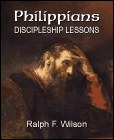 Available in PDF, Kindle, and paperback formats |
One of the characteristic phrases in Paul -- and, incidentally, John's writings too -- is "in Christ" or "in the Lord," the common Greek prepositional phrase en Christō or en kyriō. Here the preposition en is used to designate a close personal relation in which the object of the preposition is viewed as the control influence. So the preposition en here means, "under the control of, under the influence of, in close association with."[9] We see this phrase again and again in Philippians. Paul anchors all of the Christian life in one's relationship to Christ.
1:1 - "To all the saints in Christ Jesus at Philippi...."
1:14 - "Most of the brothers in the Lord have been encouraged...."
1:26 - "Your joy in Christ Jesus will overflow on account of me"
2:19 - "I hope in the Lord Jesus to send Timothy to you soon...."
2:24 - "And I am confident in the Lord that I myself will come soon."
2:29 - "Welcome him in the Lord with great joy...."
3:1 - "Finally, my brothers, rejoice in the Lord!"
3:3 - "For it is we who are the circumcision ... who glory in Christ Jesus...."
3:8-9 - "That I may gain Christ and be found in him...."
3:9 - "The righteousness ... that which is through faith in Christ...."
3:14 - "I press on toward the goal to win the prize for which God has called me heavenward in Christ Jesus."
4:1 - "You should stand firm in the Lord...."
4:2 - "I plead with Euodia and I plead with Syntyche to agree with each other in the Lord."
4:4 - "Rejoice in the Lord always."
4:7 - "And the peace of God, which transcends all understanding, will guard your hearts and your minds in Christ Jesus."
4:10 - "I rejoice greatly in the Lord that at last you have renewed your concern for me."
4:21 - "Greet all the saints in Christ Jesus."
Endnotes
[1] O'Brien, pp. 3-5.
[2] The first "we" passage in Acts concludes at Philippi in Acts 16:17.
[3] O'Brien, p. 33.
[4] Chara, BDAG 1077.
[5] Hans Conzelmann, chairo, ktl., TDNT 9:359-372, especially p. 360.
[6] Chairō, BDAG 1074-1075.
[7] Conzelmann, op. cit.
[8] Koinōnia, BDAG 552-553.
[9] En, BDAG 327-328.
Copyright © 2025, Ralph F. Wilson. <pastor![]() joyfulheart.com> All rights reserved. A single copy of this article is free. Do not put this on a website. See legal, copyright, and reprint information.
joyfulheart.com> All rights reserved. A single copy of this article is free. Do not put this on a website. See legal, copyright, and reprint information.
 |

|
In-depth Bible study books
You can purchase one of Dr. Wilson's complete Bible studies in PDF, Kindle, or paperback format -- currently 48 books in the JesusWalk Bible Study Series.
Old Testament
- Abraham, Faith of
- Jacob, Life of
- Moses the Reluctant Leader
- Joshua
- Gideon
- David, Life of
- Elijah
- Psalms
- Solomon
- Songs of Ascent (Psalms 120-134)
- Isaiah
- 28 Advent Scriptures (Messianic)
- Daniel
- Rebuild & Renew: Post-Exilic Books
Gospels
- Christmas Incarnation (Mt, Lk)
- Sermon on the Mount (Mt 5-7)
- Luke's Gospel
- John's Gospel
- Seven Last Words of Christ
- Parables
- Jesus and the Kingdom of God
- Resurrection and Easter Faith
- Apostle Peter
Acts
Pauline Epistles
- Romans 5-8 (Christ-Powered Life)
- 1 Corinthians
- 2 Corinthians
- Galatians
- Ephesians
- Philippians
- Colossians, Philemon
- 1 & 2 Thessalonians
- 1 &2 Timothy, Titus
General Epistles
Revelation
Topical

 To be notified about future articles, stories, and Bible studies, why don't you subscribe to our free newsletter, The Joyful Heart, by placing your e-mail address in the box below. We respect your
To be notified about future articles, stories, and Bible studies, why don't you subscribe to our free newsletter, The Joyful Heart, by placing your e-mail address in the box below. We respect your